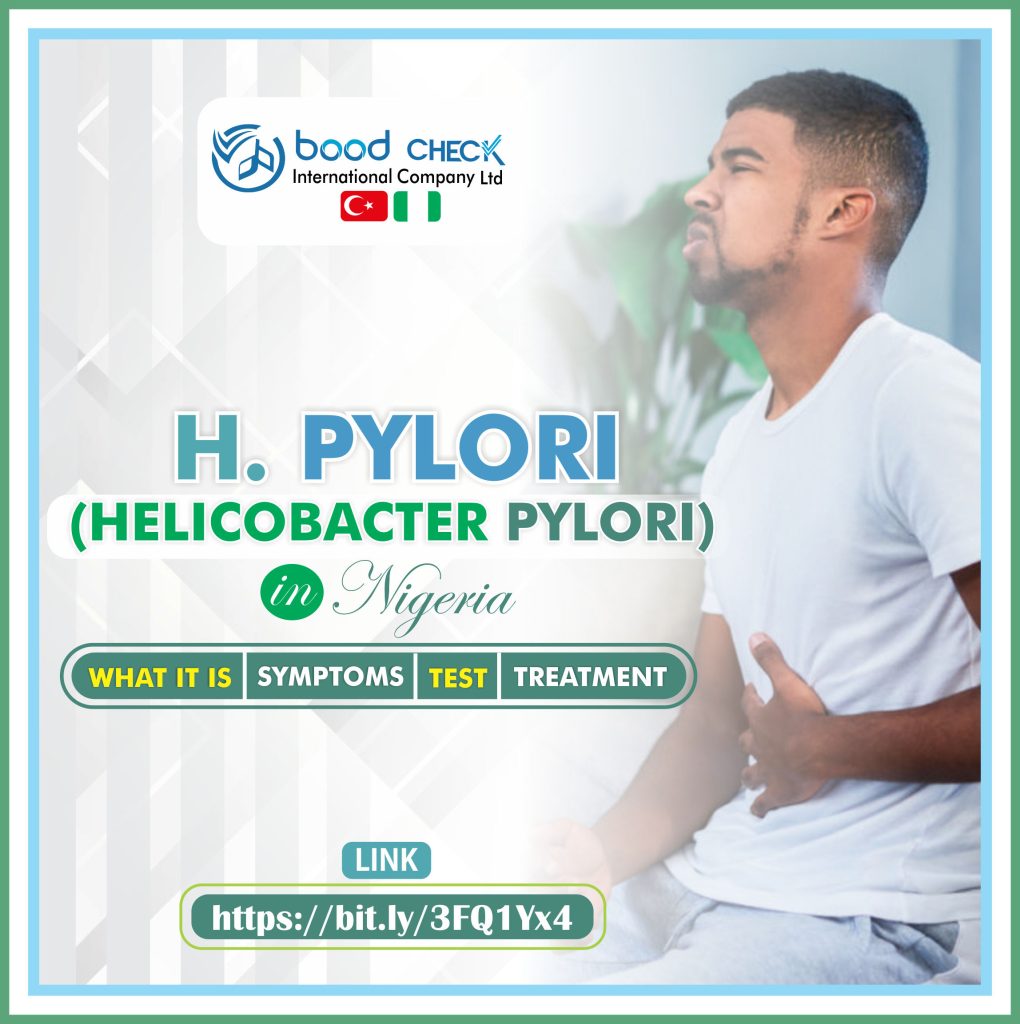Helicobacter pylori (h. pylori) in Nigeria, what it is, symptoms, test, treatment

[ez-toc]
What is Helicobacter pylori (H. pylori) ?
Helicobacter pylori which is also known as (H. pylori) is an infection that occurs when H. pylori bacteria infect your stomach. H. pylori is a type of bacteria that grows in the digestive tract and tends to attack the stomach lining. The “H” in the name is short for Helicobacter. “Helico” means spiral, which refers to the shape of the bacteria.
This bacteria infection, affects a person’s stomach during childhood and in less instances this infection affects adult. They are usually harmless, which means they do not show up with symptoms at the early stage that can be easily noticed and investigated. H. pylori adapts to a harsh, acidic environment of the stomach. This bacteria can change the environment around it and reduce the acidity so it can survive more easily. The spiral shape of H. pylori allows it to penetrate the stomach lining, where it’s protected by mucus and the body’s immune cells can’t reach it.
After many years, they can cause sores, called ulcers, in the lining of your stomach or the upper part of your small intestine. After H. pylori enters your body, it attacks the lining of your stomach, which usually protects you from the acid your body uses to digest food. Once the bacteria have done enough damage, acid can get through the lining, which leads to ulcers. These may bleed, cause infections, or keep food from moving through your digestive tract. For some people, an infection can lead to stomach cancer. Around 44 percent Trusted Source of people worldwide have an H. pylori infection, according to a meta-analysis from 2018.
For decades, doctors thought people got ulcers from stress, spicy foods, smoking, or other lifestyle habits. But when scientists discovered H. pylori in 1982, they found that the germs were the cause of most stomach ulcers.
Symptoms of Helicobacter pylori (H. pylori)
Signs and symptoms of H. pylori infection are typically related to gastritis or peptic ulcer and they may include:
- Dull or burning stomach pain (especially when you have an empty stomach)
- Bloating
- Nausea
- Vomiting
- Blood in the stool
- Feeling full early in a meal
- Discomfort or swelling in the abdomen
- Fatigue or weakness
- Unintentional weight loss
- Severe or ongoing stomach (abdominal) pain that may awaken you from sleep
- Bloody or black tarry stools
- Bloody or black vomit or vomit that looks like coffee grounds
- Loss of appetite
- Frequent burping
- Not feeling hungry
- Stool that is bloody, dark red, or black
- Trouble breathing
- Dizziness or fainting
- Feeling very tired for no reason
- Pale skin color
- Severe, sharp stomach pain
When to seek Medical Help
Based on the signs and symptoms outlined above, it is necessary to seek medical assistance, to clearly understand what needs to be done to make you feel better. This medical examination will in most cases lead to your being tested.
Where you can be Tested for Helicobacter pylori (H. Pylori)
At Boodcheck International Laboratory Kano, we have advanced machines that help detect Helicobacter pylori (H. Pylori) and our Turn Around Time (T.A.T) for this test is 1hour. This means you get your digitally printed result from any part of Kano, Nigeria or the world by entering your test details on our website or we can send your results to you via whatsapp/email or you come to our facility for the result, any method you specify is ok with us.
For easy access we are online 24/7 on WhatSapp & calls via 07062017447, for this test and may more we conduct at our Laboratory, we also offer FREE sample collection.
Treatment for Helicobacter pylori (H. Pylori)
After the test for Helicobacter pylori (H. Pylori) has been conducted, based on a medical doctor’s prescription, Helicobacter pylori (H. pylori) infection can be treated with antibiotics.
Is Helicobacter pylori (H. Pylori) transmittable
Yes it is
How Helicobacter pylori (H. Pylori) is gotten
You can get H. pylori from food, water, or utensils. It’s more common in countries or communities that lack clean water or good sewage systems. You can also pick up the bacteria through contact with the saliva or other body fluids of infected people.
Most people often get H. pylori infection during their childhood, although as an adult you can still contact the infection. As risk factors for H. pylori infection are related to living conditions in childhood, such as:
- Living in crowded conditions: Living in a home with many other people can increase your risk of H. pylori infection.
- Living without a reliable supply of clean water: Having a reliable supply of clean, running water helps reduce the risk of H. pylori.
- Living in a developing country: People living in developing countries have a higher risk of H. pylori infection. This may be because crowded and unsanitary living conditions may be more common in developing countries.
- Living with someone who has an H. pylori infection: You’re more likely to have H. pylori infection if you live with someone who has H. pylori infection.
How to prevent Helicobacter pylori (H. Pylori)
As more of the world gets access to clean water and sanitation, fewer people than before are getting the bacteria. With good health habits, you can protect yourself and your children from H. pylori.
More ways are as follows;
- Wash your hands after you use the bathroom and before you prepare or eat food. Teach your children to do the same.
- Avoid food or water that’s not clean.
- Don’t eat anything that isn’t cooked thoroughly.
- Avoid food served by people who haven’t washed their hands.
Thank you for reading, brought to you from Boodcheck Turkish International Laboratory Kano.